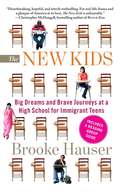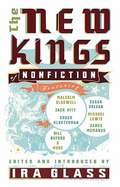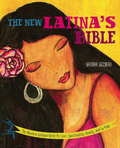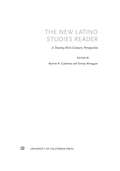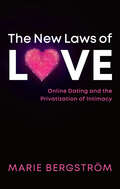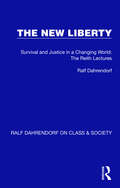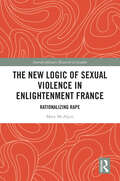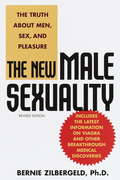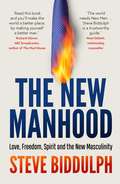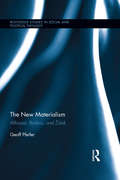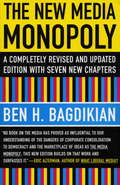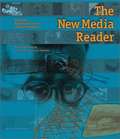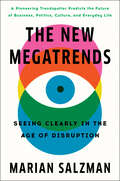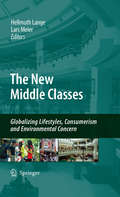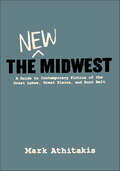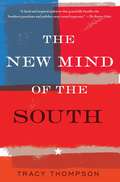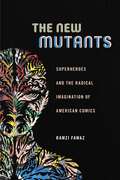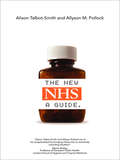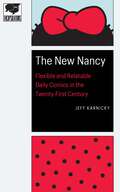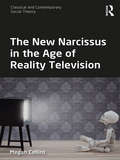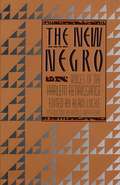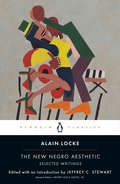- Table View
- List View
The New Kids
by Brooke HauserSome walked across deserts and mountains to get here. Others flew in on planes. One arrived after escaping in a suitcase. And some won't say how they got here. These are "the new kids": new to America and all the routines and rituals of an American high school, from lonely first days to prom. They attend the International High School at Prospect Heights in Brooklyn, which is like most high schools in some ways--its halls are filled with students gossiping, joking, flirting, and pushing the limits of the school's dress code--but all of the students are recent immigrants learning English. Together, they come from more than forty-five countries and speak more than twenty-eight languages. A singular work of narrative journalism, The New Kids chronicles a year in the life of a remarkable group of these teenage newcomers--a multicultural mosaic that embodies what is truly amazing about America. Hauser's unforgettable portraits include Jessica, kicked out of her father's home just days after arriving from China; Ngawang, who spent twenty-four hours folded up in a small suitcase to escape from Tibet; Mohamed, a diamond miner's son from Sierra Leone whose arrival in New York City is shrouded in mystery; Yasmeen, a recently orphaned Yemeni girl who is torn between pursuing college and marrying so that she can take care of her younger siblings; and Chit Su, a Burmese refugee who is the only person to speak her language in the entire school. The students in this modern-day Babel deal with enormous obstacles: traumas and wars in their countries of origin that haunt them, and pressures from their cultures to marry or to drop out and go to work. They aren't just jostling for their places in the high school pecking order--they are carving out new lives for themselves in America. The New Kids is immersion reporting at its most compelling as Brooke Hauser takes us deep inside the dramas of five International High School students who are at once ordinary and extraordinaryin their separate paths to the American Dream. Readers will be rooting for these kids long after reading the stories of where they came from, how they got here, and where they are going next.
The New Kings of Nonfiction
by Ira GlassA collection of stories-some well known, some more obscure- capturing some of the best storytelling of this golden age of nonfiction. <P><P> An anthology of the best new masters of nonfiction storytelling, personally chosen and introduced by Ira Glass, the producer and host of the award-winning public radio program This American Life. These pieces-on teenage white collar criminals, buying a cow, Saddam Hussein, drunken British soccer culture, and how we know everyone in our Rolodex-are meant to mesmerize and inspire. .
The New Latina's Bible: The Modern Latina's Guide to Love, Spirituality, Family, and La Vida
by Sandra GuzmánIn this new edition of a book that's been a go-to guide for young Latinas for years, award-winning journalist Sandra Guzman tackles the real-world complications facing Latinas today. With warmth, humor, and wisdom, The New Latina's Bible explores a wide range of issues, touching on everything from family to dating to the workplace. Guzman offers helpful tips on improving self-esteem, and provides simple, easy-to-follow women's health advice. New chapters take on important topics like sexual abuse, domestic violence, interracial relationships, and LGBTQ issues. In The New Latina's Bible, Guzman shows other Latinas that they are not alone in the day-to-day dilemmas that they encounter, and that understanding these challenges can strengthen and empower them as women. A must-read for any Latina who faces the trials of living, loving, and dreaming in two worlds-the old world of their mamá, tías, and abuelitas, and the new world in which they are immersed-this comprehensive book helps to bridge the gap between the dual realities that shape and define the nueva Latina.
The New Latino Studies Reader: A Twenty-First-Century Perspective
by Tomas Almaguer Ramon A. GutierrezThe New Latino Studies Reader is designed as a contemporary, updated, multifaceted collection of writings that bring to force the exciting, necessary scholarship of the last decades. Its aim is to introduce a new generation of students to a wide-ranging set of essays that helps them gain a truer understanding of what it's like to be a Latino in the United States. With the reader, students explore the sociohistorical formation of Latinos as a distinct panethnic group in the United States, delving into issues of class formation; social stratification; racial, gender, and sexual identities; and politics and cultural production. And while other readers now in print may discuss Mexican Americans, Puerto Ricans, Cubans and Central Americans as distinct groups with unique experiences, this text explores both the commonalities and the differences that structure the experiences of Latino Americans. Timely, thorough, and thought-provoking, The New Latino Studies Reader provides a genuine view of the Latino experience as a whole.
The New Laws of Love: Online Dating and the Privatization of Intimacy
by Marie BergströmOnline dating has become a widespread feature of modern social life. In less than two decades, seeking partners through commercial intermediaries went from being a marginal and stigmatized practice to being a common activity. How can we explain this rapid change and what does it tell us about the changing nature of love and sexuality? In contrast to those who praise online dating as a democratization of love and those who condemn it as a commodification of intimacy, this book tells a different story about how and why online dating became big. The key to understanding the growing prevalence of digital dating lies in what Marie Bergström calls “the privatization of intimacy.” Online dating takes courtship from the public to the private sphere and makes it a domestic and individual practice. Unlike courtship in traditional settings such as school, work, and gatherings of family and friends, online dating makes a clear distinction between social and sexual sociability and renders dating much more discrete. Apparently banal, this privatizing feature is fundamental for understanding both the success and the nature of digital matchmaking. Bergström also sheds light on the persisting inequalities of intimate life, showing that online dating is neither free nor fair: it has its winners and losers and it differs significantly according to gender, age and social class. Drawing on a wide range of empirical material, this book challenges what we think we know about online dating and gives us a new understanding of who, why, and how people go online to seek sex and love.
The New Liberty: Survival and Justice in a Changing World: The Reith Lectures (Ralf Dahrendorf on Class & Society #4)
by Ralf DahrendorfOriginally published in 1975, Ralf Dahrendorf’s Reith Lectures were an important contribution to public debate, exploring as they do the theme of the new liberty and being concerned to refashion liberalism to cope with the problems and tension of contemporary societies. The analysis covers endemic economic problems, such as growth, inflation and development, the complex nature of organizations, and the problems of political representation.
The New Logic of Sexual Violence in Enlightenment France: Rationalizing Rape (Interdisciplinary Research in Gender)
by Mary McAlpinThis book argues that rape as we know it was invented in the eighteenth century, examining texts as diverse as medical treatises, socio-political essays, and popular novels to demonstrate how cultural assumptions of gendered sexual desire erased rape by making a woman’s non-consent a logical impossibility. The Enlightenment promotion of human sexuality as natural and desirable required a secularized narrative for how sexual violence against women functioned. Novel biomedical and historical theories about the "natural" sex act worked to erase the concept of heterosexual rape. McAlpin intervenes in a far-ranging assortment of scholarly disciplines to survey and demonstrate how rape was rationalized: the history of medicine, the history of sexuality, the development of the modern self, the social contractarian tradition, the global eighteenth century, and the libertine tradition in the eighteenth-century novel. This intervention will be essential reading to students and scholars in gender studies, literature, cultural studies, visual studies, and the history of sexuality.
The New Male Sexuality: The Truth About Men, Sex, and Pleasure
by Bernie ZilbergeldThe New Male Sexuality addresses the most urgent questions of men today--and of the women who love them. Bernie Zilbergeld reports findings from his twenty years as a psychologist specializing in human sexuality, as well as those other experts in the field, and shares his own and his clients' experiences. the result is the most comprehensive guide ever to enhancing desire and arousal, focusing on pleasure rather than performance, and keeping sex exciting and fulfilling. Clear, comprehensive, witty, and refreshingly realistic, The New Male Sexuality is destined to be a classic of the nineties and beyond. From the Paperback edition.
The New Manhood: Love, Freedom, Spirit and the New Masculinity
by Steve BiddulphThe landmark text aimed at conquering toxic masculinity and paving the way for a fairer world, updated for a new generation. For twenty years, Steve Biddulph’s groundbreaking book Manhood and the revised edition, The New Manhood, have had a remarkable impact around the world. Thousands of men have reconciled with their fathers, become more involved with their children, rejuvenated their marriages and made sweeping changes to their lives. This book explores every aspect of a man’s life in an honest and uplifting way: love, friendship, sex, marriage, raising children, spirituality and finding your true work – all in plain language and illuminated with powerful, real-life stories. This is the handbook for men of all ages, and for the women who love them – now with a new foreword by the author, ‘Delivering the Male’. ‘Steve Biddulph is a spellbinder.’ Charles Wooley, 60 Minutes ‘I wish Steve Biddulph had been my dad.’ Sam de Brito, author of The Lost Boys and Hello Darkness ‘Read this book and you’ll make the world a better place.’ Richard Glover, author of The Land Before Avocado ‘The world needs New Men . . . Steve Biddulph is a trustworthy guide.’ Noel Giblett, relationship counsellor ‘This landmark work is for those who truly want to understand and nurture the men and boys in their lives, and for men who want to understand themselves better’ Maggie Hamilton, author of What Men Don’t Talk About
The New Materialism: Althusser, Badiou, and Žižek (Routledge Studies in Social and Political Thought #102)
by Geoff PfeiferAlain Badiou and Slavoj Žižek have become two of the dominant voices in contemporary philosophy and critical theory. In this book, Geoff Pfeifer offers an in-depth look at their respective views. Using Louis Althusser’s materialism as a starting point—which, as Pfeifer shows, was built partially as a response to the Marxism of the Parti Communiste Français and partially in dialogue with other philosophical movements and intellectual currents of its times—the book looks at the differing ways in which both Badiou’s and Žižek’s work attempt to respond to issues that arise within the Althusserian edifice. Pfeifer argues here that, ultimately, Žižek’s materialism succeeds in responding to these issues in ways that Badiou’s does not. In building this argument, Pfeifer engages not only with the work of Althusser, Badiou, and Žižek and their intellectual backgrounds, but also with much of the contemporary scholarship surrounding these thinkers. As such, Pfeifer’s book is an important addition to the ongoing debates within contemporary critical theory.
The New Media Monopoly
by Ben H. BagdikianWhen the first edition of The Media Monopoly was published in 1983, critics called Ben Bagdikian's warnings about the chilling effects of corporate ownership and mass advertising on the nation's news "alarmist." Since then, the number of corporations controlling most of America's daily newspapers, magazines, radio and television stations, book publishers, and movie companies has dwindled from fifty to ten to five.The most respected critique of modern mass media ever issued is now published in a completely updated and revised twentieth anniversary edition.'Ben Bagdikian has written the first great media book of the twenty-first century. The New Media Monopoly will provide a roadmap to understanding how we got here and where we need to go to make matters better.' -Robert McChesney, author of Rich Media, Poor DemocracyFrom the Trade Paperback edition.
The New Media Nation: Indigenous Peoples and Global Communication (Anthropology of Media #2)
by Valerie AliaAround the planet, Indigenous people are using old and new technologies to amplify their voices and broadcast information to a global audience. This is the first portrait of a powerful international movement that looks both inward and outward, helping to preserve ancient languages and cultures while communicating across cultural, political, and geographical boundaries. Based on more than twenty years of research, observation, and work experience in Indigenous journalism, film, music, and visual art, this volume includes specialized studies of Inuit in the circumpolar north, and First Nations peoples in the Yukon and southern Canada and the United States.
The New Media Reader
by Nick Montfort Noah Wardrip-FruinThis reader collects the texts, videos, and computer programs--many of them now almost impossible to find--that chronicle the history and form the foundation of the still-emerging field of new media. General introductions by Janet Murray and Lev Manovich, along with short introductions to each of the texts, place the works in their historical context and explain their significance. The texts were originally published between World War II--when digital computing, cybernetic feedback, and early notions of hypertext and the Internet first appeared--and the emergence of the World Wide Web--when they entered the mainstream of public life. The texts are by computer scientists, artists, architects, literary writers, interface designers, cultural critics, and individuals working across disciplines. The contributors include (chronologically) Jorge Luis Borges, Vannevar Bush, Alan Turing, Ivan Sutherland, William S. Burroughs, Ted Nelson, Italo Calvino, Marshall McLuhan, Billy Kl?Jean Baudrillard, Nicholas Negroponte, Alan Kay, Bill Viola, Sherry Turkle, Richard Stallman, Brenda Laurel, Langdon Winner, Robert Coover, and Tim Berners-Lee. The CD accompanying the book contains examples of early games, digital art, independent literary efforts, software created at universities, and home-computer commercial software. Also on the CD is digitized video, documenting new media programs and artwork for which no operational version exists. One example is a video record of Douglas Engelbart's first presentation of the mouse, word processor, hyperlink, computer-supported cooperative work, video conferencing, and the dividing up of the screen we now call non-overlapping windows; another is documentation of Lynn Hershman's Lorna, the first interactive video art installation.
The New Megatrends: Seeing Clearly in the Age of Disruption
by Marian SalzmanA pioneering forecaster predicts the trends and technologies that will shape global culture and commerce in the next two decades—a must-read guide for business leaders, entrepreneurs, and anyone looking for an edge.&“In a world of half-baked hot takes, Marian Salzman is a true seer.&”—Andrew YangA little more than twenty years ago, the Y2K computer glitch threatened to bring the global economy to its knees. But instead of overnight disruption, humankind slipped into two decades of economic turmoil, ecological angst, and tribalism, all set against the backdrop of a newly global and digital civilization. Sometimes the events that seem pivotal are just blips, while the more meaningful cultural shifts are hiding in plain sight. Marian Salzman&’s job is to uncover those hidden shifts.So what&’s in store for the next two decades?In this acutely observed guide, Salzman, whose past predictions have been heralded for coming uncannily close to the way we live now, unpacks the course of human life from the bumpy turn of the millennium through the pandemic era, when chaos and &“together apart&” are the new normal, equity has become a battle cry, and breathing space emerged as the greatest luxury of all.Drawing inspiration from John Naisbitt&’s classic 1982 book Megatrends, Salzman then turns to the two decades ahead. Navigating deftly among geographies, she connects threads across business, civic life, consumerism, family, and entertainment, revealing the trends and developments—some established, some surprising—poised to recast our past, shape our collective future, and shift our identities.In a world dominated by disruption, being prepared for change is a critical advantage. The New Megatrends is gripping reading for anyone seeking to understand the shape and texture of the next era, which, above all, will be marked by its relentless pace, new technology, and the ever-present threats of climate change and political division.
The New Middle Ages
by Jerold C. FrakesBroadens the perspective of recent work on the discourse of the Muslim Other in medieval Christendom by investigating pertinent texts, art, and artefacts, situating these local discourses of the Muslim Other in the larger cultural context of proto-Eurocentric discourse.
The New Middle Classes
by Hellmuth Lange Lars MeierThe new middle classes of developing countries are held responsible for boosting extremely resource-intensive lifestyles beyond the OECD-world thus thwarting ongoing efforts to attain a more sustainable future. But how homogeneous are their consumption patterns and why should not globalization include the extension of environmental concern, too? "The New Middle Classes" challenges a narrow understanding of lifestyles and consumption by analyzing the issue not only in terms of attitudes and preferences but of socio-economic features and governmental policies, too.
The New Midwest: A Guide to Contemporary Fiction of Great Lakes, Great Plains, and Rust Belt
by Mark Athitakis&“Dives deep into Midwestern literature, unpacking the mythology of the region and how today&’s writers are complicating our simple idea of the Heartland.&” —Huffington Post In the public imagination, Midwestern literature has not evolved far beyond heartland laborers and hardscrabble immigrants of a century past. But as the region has changed, so, in many ways, has its fiction. In this book, the author explores how shifts in work, class, place, race, and culture has been reflected or ignored by novelists and short story writers. From Marilynne Robinson to Leon Forrest, Toni Morrison to Aleksandar Hemon, Bonnie Jo Campbell to Stewart O&’Nan this book is a call to rethink the way we conceive Midwestern fiction, and one that is sure to prompt some new must-have additions to every reading list. &“Using the lens of novels and short stories published over the past 30 or so years, Athitakis seeks to illuminate the ways we still lean on literary mythology of the Midwest when it comes to defining the region.&” —Chicago Tribune &“[The New Midwest] rightly praises the Midwestern novels of Marilynne Robinson, Jeffrey Eugenides, Toni Morrison and Jonathan Franzen, but also points out works of comparable merit that warrant rediscovery.&” —The Washington Post &“The New Midwest is a crisp, engaging tip sheet and guide for further reading.&” —Milwaukee Journal-Sentinel &“A journey through the Midwest and through some key works by writers [Athitakis] thinks are most effectively using the region in their fiction.&” —Kirkus Reviews
The New Mind of the South
by Tracy ThompsonThere are those who say the South has disappeared. But in her groundbreaking, thought-provoking exploration of the region, Tracy Thompson, a Georgia native and Pulitzer Prize finalist, asserts that it has merely drawn on its oldest tradition: an ability to adapt and transform itself. Thompson spent years traveling through the region and discovered a South both amazingly similar and radically different from the land she knew as a child. African Americans who left en masse for much of the twentieth century are returning in huge numbers, drawn back by a mix of ambition, family ties, and cultural memory. Though Southerners remain more churchgoing than other Americans, the evangelical Protestantism that defined Southern culture up through the 1960s has been torn by bitter ideological schisms. The new South is ahead of others in absorbing waves of Latino immigrants, in rediscovering its agrarian traditions, in seeking racial reconciliation, and in reinventing what it means to have roots in an increasingly rootless global culture. Drawing on mountains of data, interviews, and a whole new set of historic archives, Thompson upends stereotypes and fallacies to reveal the true heart of the South today--a region still misunderstood by outsiders and even by its own people. In that sense, she is honoring the tradition inaugurated by Wilbur Joseph Cash in 1941 in his classic, The Mind of the South. Cash's book was considered the virtual bible on the origins of Southern identity and its transformation through time. Thompson has written its sequel for the twenty-first century.
The New Mind of the South
by Tracy ThompsonThere are those who say the South has disappeared. But in her groundbreaking, thought-provoking exploration of the region, Tracy Thompson, a Georgia native and Pulitzer Prize finalist, asserts that it has merely drawn on its oldest tradition: an ability to adapt and transform itself. Thompson spent years traveling through the region and discovered a South both amazingly similar and radically different from the land she knew as a child. African Americans who left en masse for much of the twentieth century are returning in huge numbers, drawn back by a mix of ambition, family ties, and cultural memory. Though Southerners remain more churchgoing than other Americans, the evangelical Protestantism that defined Southern culture up through the 1960s has been torn by bitter ideological schisms. The new South is ahead of others in absorbing waves of Latino immigrants, in rediscovering its agrarian traditions, in seeking racial reconciliation, and in reinventing what it means to have roots in an increasingly rootless global culture. Drawing on mountains of data, interviews, and a whole new set of historic archives, Thompson upends stereotypes and fallacies to reveal the true heart of the South today--a region still misunderstood by outsiders and even by its own people. In that sense, she is honoring the tradition inaugurated by Wilbur Joseph Cash in 1941 in his classic, The Mind of the South. Cash's book was considered the virtual bible on the origins of Southern identity and its transformation through time. Thompson has written its sequel for the twenty-first century.
The New Mutants: Superheroes and the Radical Imagination of American Comics (Postmillennial Pop #1)
by Ramzi Fawaz2017 The Association for the Studies of the Present Book PrizeFinalist Mention, 2017 Lora Romero First Book Award Presented by the American Studies AssociationWinner of the 2012 CLAGS Fellowship Award for Best First Book Project in LGBT StudiesHow fantasy meets reality as popular culture evolves and ignites postwar gender, sexual, and race revolutions.In 1964, noted literary critic Leslie Fiedler described American youth as “new mutants,” social rebels severing their attachments to American culture to remake themselves in their own image. 1960s comic book creators, anticipating Fiedler, began to morph American superheroes from icons of nationalism and white masculinity into actual mutant outcasts, defined by their genetic difference from ordinary humanity. These powerful misfits and “freaks” soon came to embody the social and political aspirations of America’s most marginalized groups, including women, racial and sexual minorities, and the working classes.In The New Mutants, Ramzi Fawaz draws upon queer theory to tell the story of these monstrous fantasy figures and how they grapple with radical politics from Civil Rights and The New Left to Women’s and Gay Liberation Movements. Through a series of comic book case studies—including The Justice League of America, The Fantastic Four, The X-Men, and The New Mutants—alongside late 20th century fan writing, cultural criticism, and political documents, Fawaz reveals how the American superhero modeled new forms of social belonging that counterculture youth would embrace in the 1960s and after. The New Mutants provides the first full-length study to consider the relationship between comic book fantasy and radical politics in the modern United States.
The New NHS: A Guide
by Alison Talbot-Smith Allyson M. PollockDr Alison Talbot-Smith, an experienced doctor and researcher, and Professor Allyson M. Pollock, one of the UKs leading authorities on the NHS, give a lucid and incisive account of the new NHS – which has emerged from a far-reaching programme of market-oriented changes. Providing an authoritative and accessible overview of the new NHS, the book describes: the structures and functions of the new organizations in each of the devolved countries the funding of NHS services, education, training and research and resource allocation the regulation of the new NHS systems and workforce the relationships between the NHS, the Department of Health, local authorities and regulatory bodies, and between the NHS and the private sector the future implications of current policies. This is an indispensable resource for those working in healthcare today as clinicians, academics, researchers and managers. It will also be essential reading for academics, students, and researchers in related fields, as well as the general public.
The New Nancy: Flexible and Relatable Daily Comics in the Twenty-First Century (Encapsulations: Critical Comics Studies)
by Jeff KarnickyIn The New Nancy Jeff Karnicky explores how today&’s successful daily comic strips are flexible and relatable, and he uses Olivia Jaimes&’s 2018 reboot of the long-running comic strip Nancy to illustrate the ways that contemporary comics have adapted to twenty-first-century technology and culture. Because comic creation has become part of the gig economy, flexible comics must be accessible to both online and print readers, and they must quickly grab readers&’ attention. Flexible comic creators like Jaimes must focus both on the work of producing comics and on building an audience. Daily comics also must form a relatable connection with readers. Most contemporary comic creators cultivate an online persona through which they engage readers with specific identities, beliefs, and expectations. This work might form a mutually beneficial bond that results in a successful daily comic strip, but it risks becoming fraught, toxic, and sometimes even dangerous. Jaimes cultivates a relatable persona in connection with longtime readers and new fans. Nancy finds its humor in both nostalgic objects (like cookie jars) and contemporary technological objects (like smartphones). Rebooted comic strips like Nancy directly confront the stereotypical representations that haunt the past of comics. Focusing on Nancy&’s role in contemporary culture, Karnicky uses literary studies, cultural studies, and media studies to argue that Jaimes&’s comic strip has something to say about comics, contemporary culture, and the intersection of the two.
The New Narcissus in the Age of Reality Television: Losing Sight Of Ourselves (Classical and Contemporary Social Theory)
by Megan CollinsThis book explores the emergence and encouragement of the new narcissus in our society and the ways in which this is portrayed in reality television. Through studies of well-known reality shows, including Toddlers and Tiaras, Hoarders, Sister Wives, Catfish: The TV Show, Celebrity Rehab with Dr. Drew and The Real Housewives, the author examines the combined effects of narcissism and consumerism, shedding light on the ways in which people are pushed to focus on their own biographies and self-promotion to the point of creating a false self within the individual and the development of a sense of dissatisfaction, dis-ease and unhappiness. Applying Freud’s concept of narcissism and tracing it through the work of key social theorists including Durkheim, Lasch, Goffman, Riesman, Baudrillard and Giddens, The New Narcissus in the Age of Reality Television constitutes an insightful analysis of the modern ideology of greatness, perfection or ‘being the best’, that permeates society – an ideology that overwhelms and ultimately drives the individual to dissemble and project an artificial self. A compelling argument for the importance of understanding the persistence of a powerful and dangerous trait in modern society, this book will appeal to scholars of sociology, social theory and cultural and media studies with interests in reality television, celebrity culture and modern narcissism.
The New Negro
by Alain LockeFrom the man known as the father of the Harlem Renaissance comes a powerful, provocative, and affecting anthology of writers who shaped the Harlem Renaissance movement and who help us to consider the evolution of the African American in society.With stunning works by seminal black voices such as Zora Neale Hurston, Countee Cullen, and W.E.B. DuBois, Locke has constructed a vivid look at the new negro, the changing African American finding his place in the ever shifting sociocultural landscape that was 1920s America. With poetry, prose, and nonfiction essays, this collection is widely praised for its literary strength as well as its historical coverage of a monumental and fascinating time in the history of America.
The New Negro Aesthetic: Selected Writings
by Alain LockePulitzer Prize-winning biographer edits a collection of Alain Locke's influential essays on the importance of the Black artist and the Black imaginationA Penguin ClassicFor months, the philosopher Alain Locke wrestled with the idea of the Negro as America's most vexing problem. He asked how shall Negroes think of themselves as he considered the new crop of poets, novelists, and short story writers who, in 1924, wrote about their experiences as Black people in America. He did not want to frame Harlem and Black writing as yet another protest against racism, nor did he want to focus on the sociological perspective on the "Negro problem" and Harlem as a site of crime, poverty, and dysfunction. He wanted to find new language and a new way for Black people to think of themselves. The essays and articles collected in this volume, by Locke's Pulitzer Prize–winning biographer, are the result of that new attitude and the struggle to instill the New Negro aesthetics, as Stewart calls it here, into the mind of the twentieth century. To be a New Negro poet, novelist, actor, musician, dancer, or filmmaker was to commit oneself to an arc of self-discovery of what and who the Negro was—would be—without fear that one would disappoint the white or Black bystander. In committing to that path, Locke asserted, one would uncover a "being-in-the-world" that was rich and bountiful in its creative possibilities, if Black people could turn off the noise of racism and see themselves for who they really are: a world of creative people who have transformed, powerfully and perpetually, the culture of wherever history or social forces landed them.
